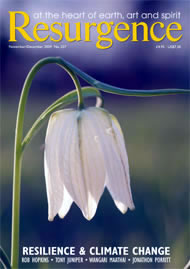Flat stone sometimes lit sometimes not | One among many moonswung creatures | That have settled in this beautiful | Uncountry of an Estuary …” begins Alice Oswald’s poem about the moon. It is set at night on the Severn estuary, in which, she explains, “various characters … talk towards the moment of moonrise and are changed by it.” She is keen to suggest that it is “not a play but a poem in several registers”, but makes free use of dramatic conditions. It opens in classical style with a prologue, followed by an alternation of the chorus and five episodes – new moon, half moon, full moon, no moon, until moon reborn, “and | Sometimes she moves behind and sometimes she’s gone.”
There is a particular style to this poem. Theatre director Peter Brook in The Empty Space proposes that there are four strains of theatre: Deadly, Rough, Holy and Immediate, and I would tentatively suggest another – Field – which might include this poem: a hybrid form which takes on a live correspondence with the world and draws rawly on its conscious and unconscious elements. Its origins, via Greek drama and the Dionysiac, could be traced back to the first shoots of poetry and agrarian cult drama. Here Oswald combines field theatre with the dark medium of mime, or silence, which is the skeleton or very bone-stuff of poetry, and this work abounds in variations on silence, a distinctively Oswaldian preoccupation: gap, pause, calm, recess, abate, listen. These nodes of silence are the shadowy ideas of figures cast off the ordinary life-shapes and life-voices that inhabit the poem.
The cast, we are told, are all real people from the Severn catchment – fisherman, birdwatcher, sailor, vicar, and so on – some alive, some dead, and the whole poem is slowly, unfoldingly re-cast by the effect of moonlight. Five phases, five turns of silence. This is the play’s (or poem’s) structure and it works effectively with an unsettling lightness to clasp the reader into its strange watery chime of five modes. The language drives incantations of slipped etymology: some profound, some slightly disharmonic moonwords like creatures under turned stones on the Severn’s glossy tidal mud; untranslatable hissed interruptions.
As Oswald evokes the river’s moon-pulled flux, she makes us aware that the moon is also a mirror: “But it’s like searchlights out here | I keep being followed by a strip of light.” Part of the moon’s effectual magic is that it borrows, by virtue of light being elsewhere. Such is the nature of a universe, and there is a sweep to this poem which lifts some of its light from other experiments, re-directing it onto the world stage of the present – the inverted turns of phrase of Hardy, Joyce, the strange infused language of Hughes (just as in Hughes, for instance, there are wavelengths of Graves, Hopkins, Neruda, Lorca) and of course, Beckett, whose Ill Seen Ill Said must make up a little of its spectrum.
Light reflected and reborn is in a way ancestral, or, put more fundamentally, part of the poetic food-chain. Even Oswald’s articled clerk, the third character in the second portion of the book, seems conscious of this, out on the mud with “all night that seeping feeding sound” watching “that bent old egret | Prodding and poising his knife and fork … I thought I know whose tongue I’m | treading on … There were those queues of reeds | Dipping their straws in the dead | There was that sly tide swiftly refilling.”
This moon poem illuminates a return to that most ancient of things, a reflective device which allows us to look directly into the absorbed light of the poetic source. It is in the pulse of the chorus that we hear Oswald most clearly: “Something needs to be said to describe my moonlight | Almost frost but softer almost ash but wholer | Made almost of water which has strictly speaking | No feature but a kind of counterlight call it insight…” And where in her previous work, Dart, Oswald slipped through the form’s various voices, here she ebbs and flows between her cast of characters and the chorus (that’s her, since the chorus, in dramatic tradition, is generally the main channel for the poet’s own voice). The use of repeating strengtheners along the band of the poem adds to the trance and invocation of the moon’s states through an ever-tumbling present. Like a Dionysiac play, the series of lit characters are in rapid succession as they change, and their pull tugs at a reader in their own head, their own dark theatre, towards a conviction that while something new seems to have begun here, it is also something very old.
Sean Borodale is an artist and poet. His poem Notes for an Atlas was performed at the Southbank Centre, London.







